
Anthony Trollope was an English novelist and civil servant of the Victorian era. Among his best-known works is a series of novels collectively known as the Chronicles of Barsetshire, which revolves around the imaginary county of Barsetshire. He also wrote novels on political, social, and gender issues, and other topical matters.

Barchester Towers is a novel by English author Anthony Trollope published by Longmans in 1857. It is the second book in the Chronicles of Barsetshire series, preceded by The Warden and followed by Doctor Thorne. Among other things it satirises the antipathy in the Church of England between High Church and Evangelical adherents. Trollope began writing this book in 1855. He wrote constantly and made himself a writing-desk so he could continue writing while travelling by train. "Pray know that when a man begins writing a book he never gives over", he wrote in a letter during this period. "The evil with which he is beset is as inveterate as drinking – as exciting as gambling".
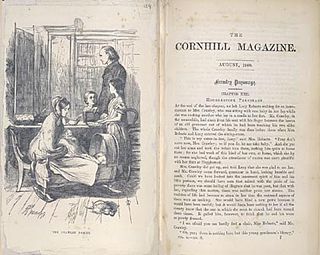
Framley Parsonage is a novel by English author Anthony Trollope. It was first published in serial form in the Cornhill Magazine in 1860, then in book form in April 1861. It is the fourth book in the Chronicles of Barsetshire series, preceded by Doctor Thorne and followed by The Small House at Allington.

A rotten or pocket borough, also known as a nomination borough or proprietorial borough, was a parliamentary borough or constituency in England, Great Britain, or the United Kingdom before the Reform Act 1832, which had a very small electorate and could be used by a patron to gain unrepresentative influence within the unreformed House of Commons. The same terms were used for similar boroughs represented in the 18th-century Parliament of Ireland. The Reform Act 1832 abolished the majority of these rotten and pocket boroughs.
The Chronicles of Barsetshire is a series of six novels by English author Anthony Trollope, published between 1855 and 1867. They are set in the fictional English county of Barsetshire and its cathedral town of Barchester. The novels concern the dealings of the clergy and the gentry, and the political, amatory, and social manoeuvrings among them.

The Last Chronicle of Barset is a novel by English author Anthony Trollope, published in 1867. It is the sixth and final book in the Chronicles of Barsetshire series, preceded by The Small House at Allington. The novel is set in the fictional county of Barsetshire and deploys characters from the earlier novels, whilst concentrating on the personnel associated with the cathedral. The main narrative thread is catalysed by the loss of a cheque which had been in the possession of the Reverend Josiah Crawley, and the subsequent reactions of his friends and enemies. Trollope drew inspiration from his father and mother in the creation of the Rev. and Mrs. Crawley. In his autobiography, Trollope regarded this novel as "the best novel I have written.", although later commentators do not agree with this judgement. The serialisation was illustrated by G H Thomas who was selected by the publisher, though Trollope had wished for Millais who had illustrated The Small House at Allington.
A book series is a sequence of books having certain characteristics in common that are formally identified together as a group. Book series can be organized in different ways, such as written by the same author, or marketed as a group by their publisher.

Frances Milton Trollope, also known as Fanny Trollope, was an English novelist who wrote as Mrs. Trollope or Mrs. Frances Trollope. Her book, Domestic Manners of the Americans (1832), observations from a trip to the United States, is the best known.
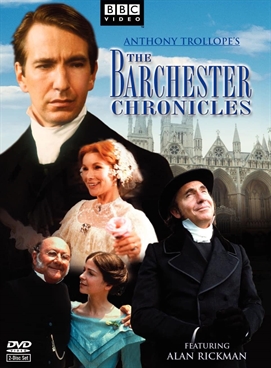
The Barchester Chronicles is a 1982 British television serial produced by Jonathan Powell for the BBC. It is an adaptation by Alan Plater of Anthony Trollope's first two Chronicles of Barsetshire, The Warden (1855) and Barchester Towers (1857). The series was directed by David Giles. Location work was videotaped in and around Peterborough Cathedral, using locations such as the Deanery and Laurel Court.
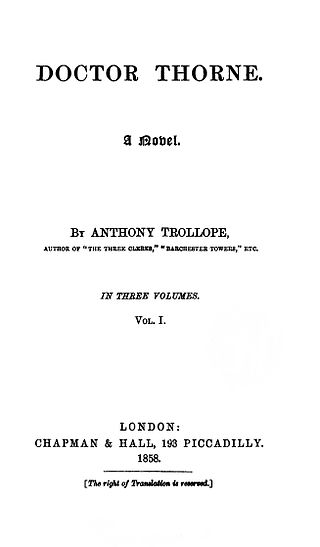
Doctor Thorne is a novel by the English author Anthony Trollope, published in 1858. It is the third book in his Chronicles of Barsetshire series, between Barchester Towers and Framley Parsonage. The idea of the plot was suggested to Trollope by his brother Thomas. Michael Sadleir places it as one of the five best of Trollope's novels and the best of the Barsetshire novels.
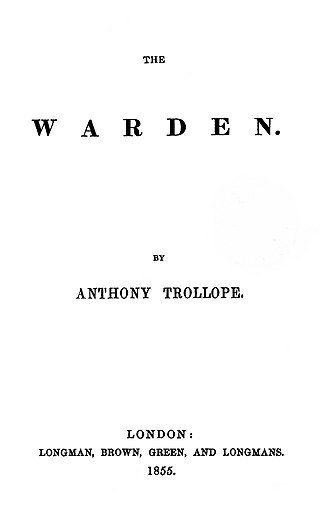
The Warden is a novel by English author Anthony Trollope published by Longman in 1855. It is the first book in the Chronicles of Barsetshire series, followed by Barchester Towers.
Michael Sadleir, born Michael Thomas Harvey Sadler, was a British publisher, novelist, book collector, and bibliographer.
The Palliser novels are six novels written in series by Anthony Trollope. They were more commonly known as the Parliamentary novels prior to their 1974 television dramatisation by the BBC broadcast as The Pallisers. Marketed as "polite literature" during their initial publication, the novels encompass several literary genres including: family saga, bildungsroman, picaresque, as well as satire and parody of Victorian life, and criticism of the British government's predilection for attracting corrupt and corruptible people to power.
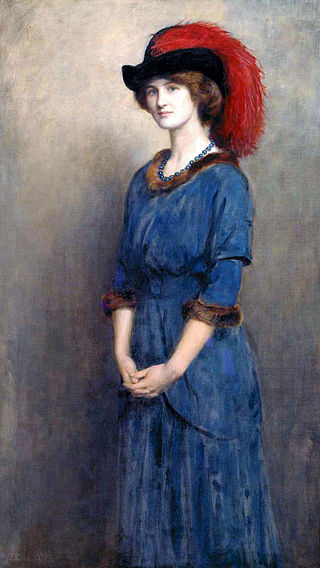
Angela Margaret Thirkell was an English and Australian novelist. She also published one novel, Trooper to Southern Cross, under the pseudonym Leslie Parker.

A cathedral close is the area immediately around a cathedral, sometimes extending for a hundred metres or more from the main cathedral building. In Europe in the Middle Ages, and often later, it was usually all the property of the cathedral, and under the bishop or cathedral's legal jurisdiction rather than that of the surrounding city. It normally had gates which were locked at night or when there were disturbances in the wider city, hence the name – "close" in the sense of "something enclosed". It usually included buildings housing diocesan offices, schools, free-standing chapels associated with the cathedral, and the palace of the bishop and other clergy houses associated with the cathedral. Cathedral closes are sometimes – but not necessarily – arranged in a sort of square around a courtyard, as at the close at Salisbury Cathedral, which is the largest in Britain.

Barchester Pilgrimage is a 1935 novel by Ronald Knox, published in London by Sheed and Ward, in which Knox picks up the narrative of the original Chronicles of Barsetshire where Anthony Trollope breaks off. Knox follows the fortunes of the children and grandchildren of Trollope's characters up to the time of writing (1934), with some gentle satire on the social, political and religious changes of the 20th century. The novel was reprinted in 1990 by the Trollope Society.
The American Senator is a novel written in 1877 by Anthony Trollope. Although not one of Trollope's better-known works, it is notable for its depictions of rural English life and for its many detailed fox hunting scenes. In its anti-heroine, Arabella Trefoil, it presents a scathing but ultimately sympathetic portrayal of a woman who has abandoned virtually all scruples in her quest for a husband. Through the eponymous Senator, Trollope offers comments on the irrational aspects of English life.

The Claverings is a novel by Anthony Trollope, written in 1864 and published in 1866–67. It is the story of a young man starting out in life, who must find himself a profession and a wife; and of a young woman who makes a marriage of convenience and must accept the consequences of her decision.

Rachel Ray is an 1863 novel by Anthony Trollope. It recounts the story of a young woman who is forced to give up her fiancé because of baseless suspicions directed toward him by the members of her community, including her sister and the pastors of the two churches attended by her sister and mother.

The Vicar of Bullhampton is an 1870 novel by Anthony Trollope. It is made up of three intertwining subplots: the courtship of a young woman by two suitors; a feud between the titular broad church vicar and a low church nobleman, abetted by a Methodist minister; and the vicar's attempt to rehabilitate a young woman who has gone astray.















